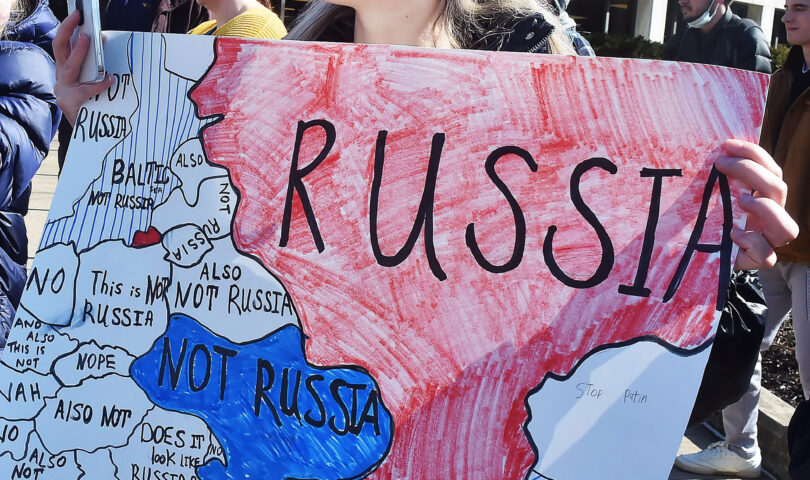For the past five days, Serhii Bahdasariants has been walking around WVU and Morgantown with two wristwatches.
The one on his right wrist is set to Ukrainian time.
“I’m looking at that watch when my mother is sleeping,” the doctoral student in biomedical sciences said.
“I’m on the internet and I’m reading the news,” he said. “I need to know where the troops are, in case I have to call her.”
Vladimir Putin’s troops, he means.
Bahdasariants hails from Kharkiv, the country’s second-largest city and the site of intense fighting over recent days – the likes of which have propelled him into the chronological limbo of two time zones, as he keeps vigil the only way he can.
He was among a handful of WVU students, professors and others with Ukrainian ties who spoke on the downtown campus Monday morning, while shelling, skirmishes – and failed acts of diplomacy – ensued in their homeland, halfway across the globe.
They gathered at the foot of Oglebay Hall, which for nearly 60 years, has carried a permanent reminder of World War II for generations of students, who may not always realize that fact.
Erected in concrete at the center of the plaza is the mast from the USS West Virginia, which was heavily damaged at Pearl Harbor.
‘I’ll say, Ukraine’
The surprise attack on the U.S. Naval Fleet in Hawaii propelled the nation into World War II, which begat the 40-year stare-down that was the Cold War.
Event speakers and organizers worried Monday that the Russian president’s Soviet-styled attempt to annex their country by force could lead to a World War III, if it isn’t stopped.
Right now, though, the infrastructure centers of cities and towns across Ukraine are still holding, mostly.
Bahdasariants can still call his mother and Khrystyna Pelchar can call hers, too – even if she doesn’t always like what she hears.
“They refuse to leave,” said Pelchar, a WVU Ph.D. candidate in political science from Lviv who has been in the U.S. for a year. Pelchar’s mother is currently outside of the city in a location that’s relatively safe, for now. Her grandmother and her sister are, too.
The women are currently preparing meals for Ukrainian soldiers, Pelchar said, while doing other home front work, including the assembling of netting and other barricades for troops making a stand.
Whatever happens, Pelchar said, Putin has already lost the ever-important war of hearts and minds, concerning his perception in the West.
Pelchar talked about that the day before in the midst of her work to organize Monday’s event.
“Putin was not expecting the courage and resolve of the Ukrainians,” she said. “Ask me who the strongest country in the world is right now, and I’ll say, Ukraine.”
What happens now?
Meanwhile, speakers Monday praised Ukrainian President Volodymyer Zelenskyy, saying he continues to show resolve, even as ceasefire talks and diplomatic measures between the country and Russia stalled Monday.
As the mechanics of conflict are debated, though, will Ukraine eventually be outgunned by attrition – as a more powerful aggressor readjusts to the scrappy brand of warfare it initially wasn’t expecting?
Sergiy Yakovenko isn’t so sure.
The WVU neuroscience professor, like his student Bahdasariants, is also a native of Kharkiv. His parents still live there, in fact, and the professor in past years has also taught college courses in his home country through international partnerships.
Earlier Monday, Yakovenko’s parents informed their son of an international partnership of a different kind, formed a couple of kilometers from their house.
Ukrainians are still dying, the professor said, but on this morning, as his mother and father watched, a group of Russian soldiers simply put up their hands – and surrendered.
They were tired and appeared to be disoriented, according to neighborhood accounts, Yakovenko said.
“I’m not sure the Russia military is what it’s portrayed to be.”
TWEET@DominionPostWV




